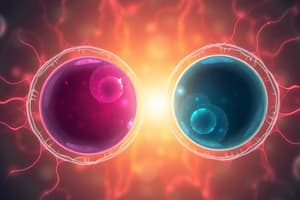Podcast
Questions and Answers
What is the primary purpose of meiosis in multicellular organisms?
What is the primary purpose of meiosis in multicellular organisms?
- Asexual reproduction
- Growth and tissue repair
- Production of gametes for sexual reproduction (correct)
- Cell division for immune response
During meiosis, what is the significance of crossing over?
During meiosis, what is the significance of crossing over?
- It duplicates chromosomes to prepare for cell division
- It ensures that all chromosomes are copied accurately
- It halts cell division until conditions are favorable
- It increases genetic variation by exchanging genetic material between homologous chromosomes (correct)
Which statement about independent assortment is true in the context of meiosis?
Which statement about independent assortment is true in the context of meiosis?
- It involves the chromosomes aligning at the equatorial plate in mitosis
- It refers to chromosomes being sorted into gametes independently of one another (correct)
- It only occurs in asexual reproduction
- It is a process that creates identical copies of chromosomes
How do gametes differ in terms of size and mobility in anisogamy?
How do gametes differ in terms of size and mobility in anisogamy?
Which of the following describes the key difference between mitosis and meiosis?
Which of the following describes the key difference between mitosis and meiosis?
In what way does meiosis contribute to genetic variability in offspring?
In what way does meiosis contribute to genetic variability in offspring?
What is the role of haploid gametes in sexual reproduction?
What is the role of haploid gametes in sexual reproduction?
Which stage of meiosis involves the separation of homologous chromosomes?
Which stage of meiosis involves the separation of homologous chromosomes?
What is the primary result of crossing over during meiosis?
What is the primary result of crossing over during meiosis?
Which statement accurately describes the process of independent assortment during meiosis I?
Which statement accurately describes the process of independent assortment during meiosis I?
What does meiosis II directly produce from the haploid daughter cells?
What does meiosis II directly produce from the haploid daughter cells?
In what phase of meiosis does homologous recombination occur?
In what phase of meiosis does homologous recombination occur?
How does meiosis contribute to genetic diversity?
How does meiosis contribute to genetic diversity?
Which of the following best characterizes the outcome of meiosis compared to mitosis?
Which of the following best characterizes the outcome of meiosis compared to mitosis?
Which of the following mechanisms does NOT increase genetic variation during meiosis?
Which of the following mechanisms does NOT increase genetic variation during meiosis?
Which of the following statements about sister chromatids during meiosis II is accurate?
Which of the following statements about sister chromatids during meiosis II is accurate?
What is the primary purpose of meiosis as opposed to mitosis?
What is the primary purpose of meiosis as opposed to mitosis?
How many haploid daughter cells are produced at the end of meiosis I?
How many haploid daughter cells are produced at the end of meiosis I?
What occurs during crossing-over in meiosis?
What occurs during crossing-over in meiosis?
Which statement best describes independent assortment?
Which statement best describes independent assortment?
In the context of gamete formation, what is the significance of the term 'haploid'?
In the context of gamete formation, what is the significance of the term 'haploid'?
During which phase of meiosis do homologous chromosomes separate?
During which phase of meiosis do homologous chromosomes separate?
How many combinations of chromosomes can be produced from independent assortment if a species has 23 pairs of chromosomes?
How many combinations of chromosomes can be produced from independent assortment if a species has 23 pairs of chromosomes?
What type of cells are produced at the end of meiosis II?
What type of cells are produced at the end of meiosis II?
Which of the following best describes a heterozygous individual?
Which of the following best describes a heterozygous individual?
Why are daughter cells from meiosis genetically unique?
Why are daughter cells from meiosis genetically unique?
Flashcards are hidden until you start studying
Study Notes
Meiosis Overview
- Meiosis is a type of cell division that produces four unique daughter cells with half the number of chromosomes as the parent cell.
- Meiosis is used to create gametes (sperm or egg cells) for sexual reproduction.
Meiosis vs. Mitosis
- Mitosis produces two diploid daughter cells that are genetically identical.
- Each daughter cell receives copies of all chromosomes in the starting cell.
- Meiosis produces four haploid daughter cells.
- Each daughter cell receives one complete set of chromosomes.
An Overview of Meiosis I
- During meiosis I, the diploid (2n) parent cell produces two haploid (n) daughter cells.
- The homologs in each chromosome pair separate via the Law of Independent Assortment (metaphase I).
- Homologs may swap chromosome segments via crossing-over (prophase I).
- Homologs go to different daughter cells.
- This creates two haploid (n) daughter cells.
- Each cell consists of two sister chromatids that are attached at the centromere.
So What's the Difference
- Mitosis is for growth.
- Meiosis is for reproduction.
Moo Deng
- Only ~2000 pygmy hippos are left.
- Changes in temperature and precipitation have led to more extreme droughts.
- Coupled with habitat destruction from people.
- Currently endangered.
Independent Assortment
- Describes how different genes independently separate from each other when reproductive cells are developing.
- Alleles of at least two genes are sorted into gametes independently of one another.
- The allele inherited by one gamete does not affect the allele inherited by the other gametes (alleles are not linked together).
- Happens in metaphase I.
Terminology
- Allele: One of two or more versions of a DNA sequence at a given locus (genomic location).
- "Alternate version of a gene."
- Individuals inherit two alleles (one from each parent).
- Homozygous: Has two versions of the same allele (ex: BB or bb).
- Heterozygous: Has different versions of an allele (ex: Bb).
Independent Assortment
- For a diploid species, the possible number of different random alignments during Metaphase I = 2^n, where n = the number of chromosomes in a haploid cell.
- Humans have 23 chromosomes per haploid cell: 2^23 = 8,388,608 possible alignments!
Sexual Reproduction vs. Asexual Reproduction
- Sexual reproduction produces offspring with unique combinations of genes inherited from their biological parent(s).
- Asexual reproduction produces offspring that are genetically identical to the reproducing individuals.
- Many species can reproduce sexually and asexually.
Adaptive Significance of Sexual Reproduction
- Disadvantages
- Complicated
- Costly (time and energy to find mate, investment into mating strategies)
- Potentially dangerous
- Not always successful
- Advantages
- Increases genetic variation and diversity between individuals and within populations.
Sexual Reproduction = Genetic and Phenotypic Variability
- Genetic material from two parents combined.
- Independent assortment of chromosomes during meiosis.
- Recombination during meiosis (crossing over)
Gametes
- Gametes are haploid reproductive cells that unite during sexual reproduction to form a zygote.
- Gametes are classified based on their size and mobility.
Gamete Variation
- Isogamy: Gametes are the same size.
- Anisogamy: Gametes are different sizes.
- Oogamy: Gametes are different sizes with an immobile egg and mobile sperm.
Meiosis
- A type of cell division used in sexual reproduction to create gametes by reducing the number of chromosomes in a cell.
- In meiosis, cell division happens twice.
Homologous Recombination (Crossing-Over)
- Exchange of genetic information between non-sister chromatids (i.e., homologs).
- Produces recombinant chromosomes.
- Happens in prophase I when homologous chromosomes are in close proximity.
- Increases genetic variation.
An Overview of Meiosis II
- During meiosis II, the haploid (n) daughter cells split to make four unique haploid (n) daughter cells.
- The sister chromatids in each cell pair separate.
- There is no crossing over or independent assortment.
- Sister chromatids go to different daughter cells.
- Creates four unique haploid daughter cells.
How Does Meiosis Increase Genetic Variability?
- Genetic variation increases as a result of the independent assortment of chromosomes during meiosis I and crossing-over.
How Does Crossing Over Further Increase Genetic Variability?
- Crossing over creates new combinations of genes from the parents.
Variations in Chromosome Banding
- Stained with Giemsa, which produces alternating light (G-C rich) and dark (A-T rich) bands on chromosomes.
Studying That Suits You
Use AI to generate personalized quizzes and flashcards to suit your learning preferences.




